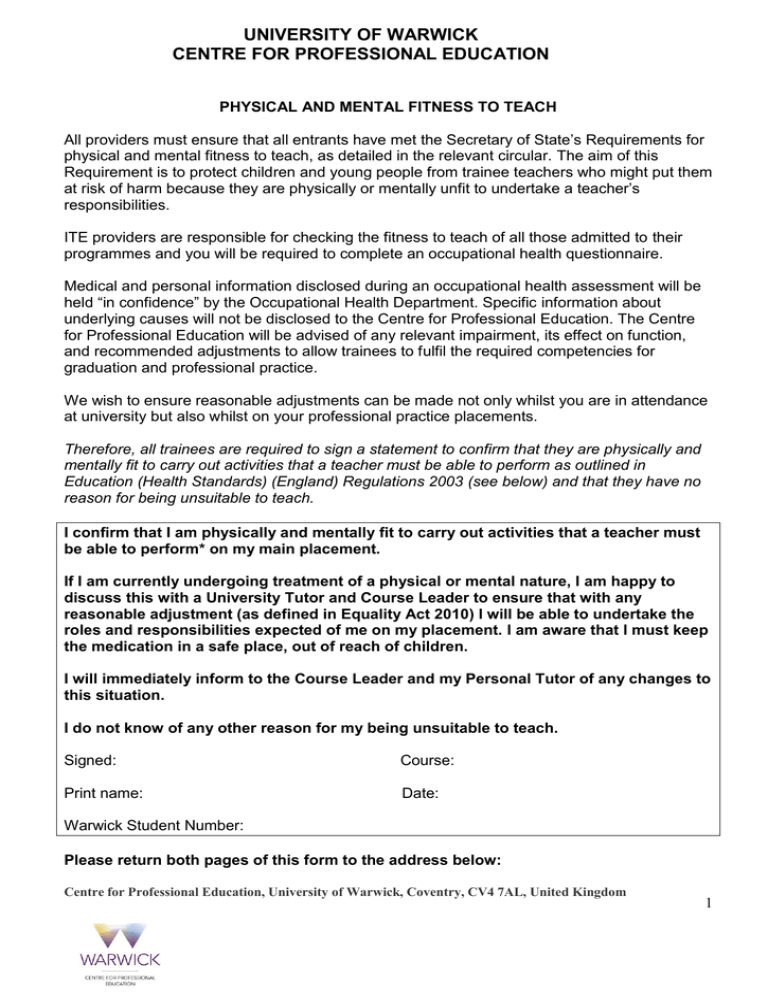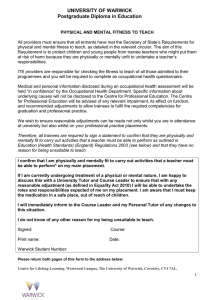UNIVERSITY OF WARWICK CENTRE FOR PROFESSIONAL EDUCATION
advertisement

UNIVERSITY OF WARWICK CENTRE FOR PROFESSIONAL EDUCATION PHYSICAL AND MENTAL FITNESS TO TEACH All providers must ensure that all entrants have met the Secretary of State’s Requirements for physical and mental fitness to teach, as detailed in the relevant circular. The aim of this Requirement is to protect children and young people from trainee teachers who might put them at risk of harm because they are physically or mentally unfit to undertake a teacher’s responsibilities. ITE providers are responsible for checking the fitness to teach of all those admitted to their programmes and you will be required to complete an occupational health questionnaire. Medical and personal information disclosed during an occupational health assessment will be held “in confidence” by the Occupational Health Department. Specific information about underlying causes will not be disclosed to the Centre for Professional Education. The Centre for Professional Education will be advised of any relevant impairment, its effect on function, and recommended adjustments to allow trainees to fulfil the required competencies for graduation and professional practice. We wish to ensure reasonable adjustments can be made not only whilst you are in attendance at university but also whilst on your professional practice placements. Therefore, all trainees are required to sign a statement to confirm that they are physically and mentally fit to carry out activities that a teacher must be able to perform as outlined in Education (Health Standards) (England) Regulations 2003 (see below) and that they have no reason for being unsuitable to teach. I confirm that I am physically and mentally fit to carry out activities that a teacher must be able to perform* on my main placement. If I am currently undergoing treatment of a physical or mental nature, I am happy to discuss this with a University Tutor and Course Leader to ensure that with any reasonable adjustment (as defined in Equality Act 2010) I will be able to undertake the roles and responsibilities expected of me on my placement. I am aware that I must keep the medication in a safe place, out of reach of children. I will immediately inform to the Course Leader and my Personal Tutor of any changes to this situation. I do not know of any other reason for my being unsuitable to teach. Signed: Course: Print name: Date: Warwick Student Number: Please return both pages of this form to the address below: Centre for Professional Education, University of Warwick, Coventry, CV4 7AL, United Kingdom 1 UNIVERSITY OF WARWICK CENTRE FOR PROFESSIONAL EDUCATION Trainees with disabilities We are keen to support you to succeed so this question is not intended to discriminate against you. Would you welcome a meeting with a university tutor to discuss and agree any reasonable adjustments which could be made to support you in school? Yes/No *Health and physical capacity to teach The activities that a teacher must be able to perform are set out in the Fitness to Teach – Occupational health guidance for the training and employment of teachers (DfEE 2000) and Education (Health Standards) (England) Regulations 2003. These activities include: The ability to communicate effectively with pupils, colleagues and pupils’ relatives Possession of sound judgement and insight The ability to remain alert at all times The ability to respond to pupils’ needs rapidly and effectively The ability to manage classes The trainee must not constitute a risk to the health, safety or wellbeing of pupils. planning and preparing lessons and courses for children and young people delivering lessons assessing development, progress and attainment, and reporting on development, progress and attainment There is no legal requirement for a teacher to be able to lift heavy objects, drive, swim, deal with a child’s everyday physical needs or participate in physically demanding activities. Further information on training to teach with a disability is available from the DfE website. Examples of impairment needing careful assessment to ensure safe teaching practice: Mobility – must be compatible with outcomes set by the DfE, including responding to pupils’ needs rapidly and effectively Upper Limb function – all trainees must have manual dexterity sufficient to achieve mandatory outcomes set by the DfE. Vision, Hearing and Speech – must be compatible with the ability to communicate effectively with pupils, colleagues and pupils’ relatives Freedoms of infection – Trainees have a responsibility to protect pupils and colleagues from an increased risk of infection. If trainee teacher is aware of that they have a condition which could be transmitted to a pupil, they must take and follow advice from a consultant in occupational health or from another suitably qualified doctor. Interruption of consciousness – The risk must be low enough to represent minimal risk to pupils and must be compatible with responding to pupils’ needs rapidly and effectively. Concentration, awareness, memory, ability to learn and understand, literacy and numeracy – trainees must be able to meet the competence standards set by the DfE in relation to spoken, written and electronic communication with pupils, colleagues and pupils’ relatives, as well as sound judgement and insight. Trainees must have full awareness of their own mental health, when to seek help and from whom. 2






![afl_mat[1]](http://s2.studylib.net/store/data/005387843_1-8371eaaba182de7da429cb4369cd28fc-300x300.png)
